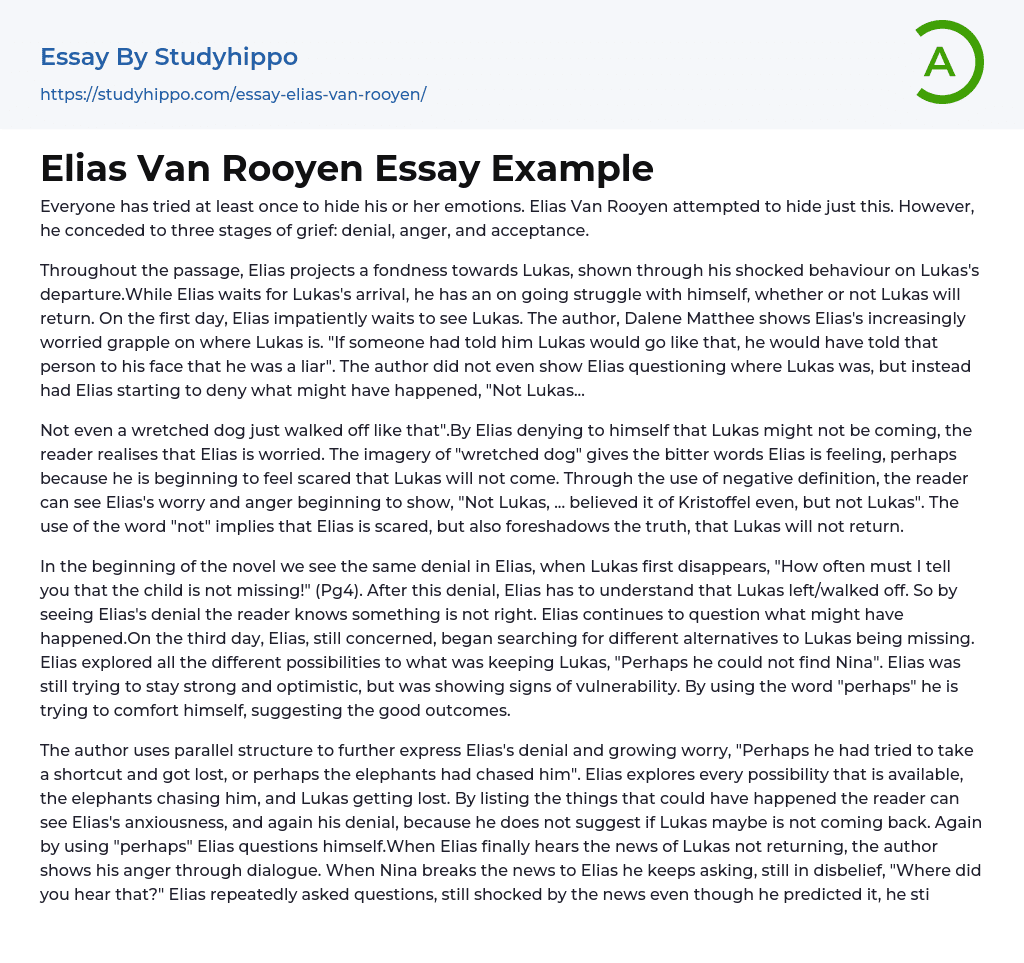Everyone has tried at least once to hide his or her emotions. Elias Van Rooyen attempted to hide just this. However, he conceded to three stages of grief: denial, anger, and acceptance.
Throughout the passage, Elias projects a fondness towards Lukas, shown through his shocked behaviour on Lukas's departure.While Elias waits for Lukas's arrival, he has an on going struggle with himself, whether or not Lukas will return. On the first day, Elias impatiently waits to see Lukas. The author, Dalene Matthee shows Elias's increasingly worried grapple on where Lukas is. "If someone had told him Lukas would go like that, he would have told that person to his face that he was a liar". The author did not even show Elias questioning where Lukas was, but instead had Elias starting to deny what might h
...ave happened, "Not Lukas...
Not even a wretched dog just walked off like that".By Elias denying to himself that Lukas might not be coming, the reader realises that Elias is worried. The imagery of "wretched dog" gives the bitter words Elias is feeling, perhaps because he is beginning to feel scared that Lukas will not come. Through the use of negative definition, the reader can see Elias's worry and anger beginning to show, "Not Lukas, ... believed it of Kristoffel even, but not Lukas". The use of the word "not" implies that Elias is scared, but also foreshadows the truth, that Lukas will not return.
In the beginning of the novel we see the same denial in Elias, when Lukas first disappears, "How often must I tell you that the child is not missing!" (Pg4). After this denial, Elias has
to understand that Lukas left/walked off. So by seeing Elias's denial the reader knows something is not right. Elias continues to question what might have happened.On the third day, Elias, still concerned, began searching for different alternatives to Lukas being missing. Elias explored all the different possibilities to what was keeping Lukas, "Perhaps he could not find Nina". Elias was still trying to stay strong and optimistic, but was showing signs of vulnerability. By using the word "perhaps" he is trying to comfort himself, suggesting the good outcomes.
The author uses parallel structure to further express Elias's denial and growing worry, "Perhaps he had tried to take a shortcut and got lost, or perhaps the elephants had chased him". Elias explores every possibility that is available, the elephants chasing him, and Lukas getting lost. By listing the things that could have happened the reader can see Elias's anxiousness, and again his denial, because he does not suggest if Lukas maybe is not coming back. Again by using "perhaps" Elias questions himself.When Elias finally hears the news of Lukas not returning, the author shows his anger through dialogue. When Nina breaks the news to Elias he keeps asking, still in disbelief, "Where did you hear that?" Elias repeatedly asked questions, still shocked by the news even though he predicted it, he still avoided the truth. Elias tries to take his anger out on Nina, "If she would come closer so that he could lay his hands on her." Elias upset by the news wants to discipline his other children in order to keep his family under control.
Nina wished to take clothes back to Lukas, but
Elias selfishly wanted to keep the clothes, "Lukas could come and fetch them himself". Elias shows petty behaviour due to his upset in Lukas. In the passage he continually makes snide remarks to Lukas, trying to regain some pride.Towards the end of the passage, Elias comes to terms with Lukas leaving. Elias accepts that Lukas left, and looks at other people's perspectives to help him understand the truth, "Willem said Lukas had always had it in him to run away". By looking at his family's perspectives he explains to himself that it was inevitable that Lukas left, and he gets information that perhaps he ignored. Elias at the very end of the passage accepts Lukas's departure from the forest, "it was true". The use of the short sentence implies a sad tone, while Elias's struggle with the truth comes to an end, he feels hurt, but he accepted it.
The author in a way wants the reader to feel affection towards Elias, by explaining his grief, in different emotional states, by the end; you can feel Elias is sullen and almost defeated. Elias adds at the end, "Only God in heaven knew what she would bring upon them next". Elias is referring to the news Nina always brings, but he also feels he has been hard done by, and almost acts like he is giving up.This passage is significant because it reveals deeper insight to Elias's character and his love for Lukas. Through Elias's thoughts, actions and dialogue the reader step by step sees Elias's grief process: denial, then anger and lastly acceptance. Because Elias is so hurt and angered the reader can see, Elias
developed a certain fondness towards Lukas.
- Ambition essays
- Anger essays
- Betrayal essays
- Boredom essays
- Confidence essays
- Courage essays
- Desire essays
- Disgrace essays
- Doubt essays
- Empathy essays
- Fairness essays
- Fear essays
- Feeling essays
- Forgiveness essays
- Grief essays
- Guilt essays
- Happiness essays
- Harmony essays
- Hate essays
- Honesty essays
- Honor essays
- Hope essays
- Humanity essays
- Inspiration essays
- Kindness essays
- Laughter essays
- Loneliness essays
- Lost essays
- Loyalty essays
- Need essays
- Passion essays
- Pressure essays
- Pride essays
- Regret essays
- Respect essays
- Responsibility essays
- Sarcasm essays
- Shame essays
- Suffering essays
- Suspense essays
- Tolerance essays
- John Locke essays
- 9/11 essays
- A Good Teacher essays
- A Healthy Diet essays
- A Modest Proposal essays
- A&P essays
- Academic Achievement essays
- Achievement essays
- Achieving goals essays




